Virgil Masayesva Memorial:
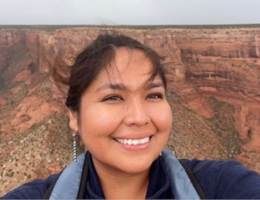 Yá’át’ééh Kayla Yazzie, I am from St. Michaels, AZ, and Shiprock, NM. I attended a Catholic school for most of my childhood till high school, but I also grew up learning my traditional values
from my grandparents, so it felt like a mix of two worlds. Growing up I have always remembered two life lessons that was taught by my grandparents which were the importance of our Mother
Earth and my education. These two life lessons is what keeps me motivated, even today, and I look forward to continuing my education through a PhD program in the future.
Yá’át’ééh Kayla Yazzie, I am from St. Michaels, AZ, and Shiprock, NM. I attended a Catholic school for most of my childhood till high school, but I also grew up learning my traditional values
from my grandparents, so it felt like a mix of two worlds. Growing up I have always remembered two life lessons that was taught by my grandparents which were the importance of our Mother
Earth and my education. These two life lessons is what keeps me motivated, even today, and I look forward to continuing my education through a PhD program in the future.
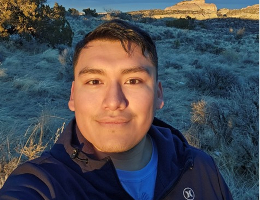 I'm a 23-year-old male Native American from the Navajo tribe. I currently have my Bachelor’s degree in biology and am pursuing my Master's degree in forestry. I hope to pursue a career in the
Forest Service or in a National Park. I have always liked learning and helping the environment, trying to make things better than they are now or in the future.
I'm a 23-year-old male Native American from the Navajo tribe. I currently have my Bachelor’s degree in biology and am pursuing my Master's degree in forestry. I hope to pursue a career in the
Forest Service or in a National Park. I have always liked learning and helping the environment, trying to make things better than they are now or in the future.
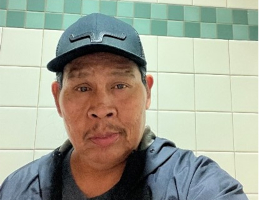 My name is Darren Olney, and I am a proud enrolled member of the Confederated Tribes and Bands of the Yakama Nation, located in south-central Washington State. I am currently a second-year
graduate student in Northern Arizona University's School of Earth and Sustainability, pursuing a Master of Science in Environmental Science and Policy.
My name is Darren Olney, and I am a proud enrolled member of the Confederated Tribes and Bands of the Yakama Nation, located in south-central Washington State. I am currently a second-year
graduate student in Northern Arizona University's School of Earth and Sustainability, pursuing a Master of Science in Environmental Science and Policy.
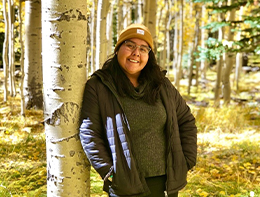 Yá’át’ééh, shik’éí dóó shidine’é. Shí éí Amber Benally yinishyé. Tł'ízí lání nishłį́. Tódich'ii'nii bashishchiin. Kiisaanii dóó Naashtʼézhí dineʼé dashicheii. Kiyaa'áanii dashinalí. Ákót’éego,
Diné Asdzáán nishłį́. Tó Naneesdizí déé’ naashá. Axhé'héé!
Yá’át’ééh, shik’éí dóó shidine’é. Shí éí Amber Benally yinishyé. Tł'ízí lání nishłį́. Tódich'ii'nii bashishchiin. Kiisaanii dóó Naashtʼézhí dineʼé dashicheii. Kiyaa'áanii dashinalí. Ákót’éego,
Diné Asdzáán nishłį́. Tó Naneesdizí déé’ naashá. Axhé'héé!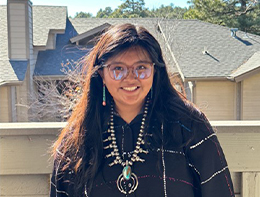 Ashley is a young Navajo woman, originally from Window Rock, AZ. She is currently attending her senior year at Northern Arizona University (NAU), where she majors in Psychological Sciences with a minor
in Criminal Justice/Criminology. In addition, Ashley is a research assistant at NAU. Her research interests include addressing mental health, social, and environmental injustices within Native communities.
In the future, she would like to assist in addressing and improving the wellbeing’s of the Navajo people.
Ashley is a young Navajo woman, originally from Window Rock, AZ. She is currently attending her senior year at Northern Arizona University (NAU), where she majors in Psychological Sciences with a minor
in Criminal Justice/Criminology. In addition, Ashley is a research assistant at NAU. Her research interests include addressing mental health, social, and environmental injustices within Native communities.
In the future, she would like to assist in addressing and improving the wellbeing’s of the Navajo people.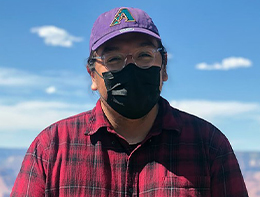 Hanson Mike is Diné from Whippoorwill, Arizona. He is a Northern Arizona University student, in the School of Earth and Sustainability’s program for the Master of Science in Environmental Science & Policy.
His goal is to use my research experience and passion for the environment to create solutions in water policy for Indigenous tribes and communities who seek to re-Indigenize water governance and stewardship
of public lands and waters in the United States.
Hanson Mike is Diné from Whippoorwill, Arizona. He is a Northern Arizona University student, in the School of Earth and Sustainability’s program for the Master of Science in Environmental Science & Policy.
His goal is to use my research experience and passion for the environment to create solutions in water policy for Indigenous tribes and communities who seek to re-Indigenize water governance and stewardship
of public lands and waters in the United States.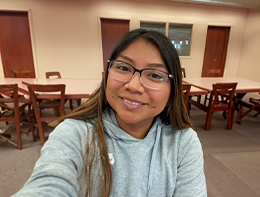 Joelle Mansfield is a member of the Hopi tribe, from the village of Sitsomovi and from the Water Clan. She has two children, 12 and 2, and a nephew who is 17. She is commuter student from the Winslow, AZ area
while also working part time with the Hopi Three Canyon Ranches in Flagstaff, AZ. As an undergraduate student at Northern Arizona University, she is pursuing a degree in Geography, Environment, and Society
with a minor in Geographical Information Systems (GIS). Science, Technology, Engineering and Math (STEM) has not always been her strong suite; nonetheless she has always found the environment interesting.
Hopi teachings and stories of creation as well as her job at the ranches has expanded her knowledge and understanding of various fields associated with the environment. Pursuing GIS is still a new aspect to
some reservations. Her ideal job would be to help native communities understand the current environment with visuals and real data specific to a tribe.
Joelle Mansfield is a member of the Hopi tribe, from the village of Sitsomovi and from the Water Clan. She has two children, 12 and 2, and a nephew who is 17. She is commuter student from the Winslow, AZ area
while also working part time with the Hopi Three Canyon Ranches in Flagstaff, AZ. As an undergraduate student at Northern Arizona University, she is pursuing a degree in Geography, Environment, and Society
with a minor in Geographical Information Systems (GIS). Science, Technology, Engineering and Math (STEM) has not always been her strong suite; nonetheless she has always found the environment interesting.
Hopi teachings and stories of creation as well as her job at the ranches has expanded her knowledge and understanding of various fields associated with the environment. Pursuing GIS is still a new aspect to
some reservations. Her ideal job would be to help native communities understand the current environment with visuals and real data specific to a tribe.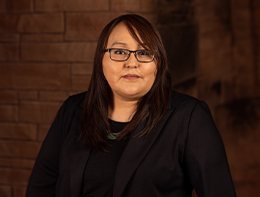 Kirby Morris is a first year Master’s student at Northern Arizona University of Biological Sciences, where she is pursuing a Master’s degree in Biology. She is the recipient of a Virgil Masayesva Scholarship,
which has allowed her to engage in research on how climate change is affecting the fungal communities on Pinus edulis (pinyon-pine) trees in the southwest. Upon completion of her master’s studies, she intends
to apply for a doctoral degree to further her knowledge of biology and progress toward a career as a researcher.
Kirby Morris is a first year Master’s student at Northern Arizona University of Biological Sciences, where she is pursuing a Master’s degree in Biology. She is the recipient of a Virgil Masayesva Scholarship,
which has allowed her to engage in research on how climate change is affecting the fungal communities on Pinus edulis (pinyon-pine) trees in the southwest. Upon completion of her master’s studies, she intends
to apply for a doctoral degree to further her knowledge of biology and progress toward a career as a researcher.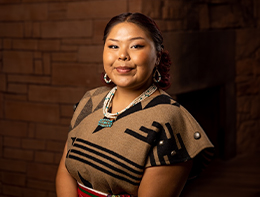 Mariessa Fowler is from Coppermine, Arizona and grew up on the Navajo reservation. As a first-generation student, she is in the third year in the Environmental Science program with an emphasis in policy and
administration. She wants to continue her education and get a master’s degree within water policy. She wants to pursue a career with government-to-government communication, between tribal affairs and the US
government regarding environmental protection and policy. She wants to work for the EPA (Environmental Protection Agency) and try to help indigenous tribes with communicating to the government.
Mariessa Fowler is from Coppermine, Arizona and grew up on the Navajo reservation. As a first-generation student, she is in the third year in the Environmental Science program with an emphasis in policy and
administration. She wants to continue her education and get a master’s degree within water policy. She wants to pursue a career with government-to-government communication, between tribal affairs and the US
government regarding environmental protection and policy. She wants to work for the EPA (Environmental Protection Agency) and try to help indigenous tribes with communicating to the government.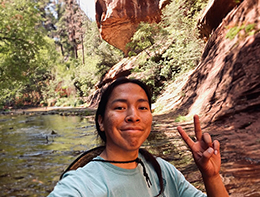 Titus Bert is a Dine (Navajo) from Pinon AZ from the community of Black Mesa in the Navajo Nation. Titus is a student at Northern Arizona University (NAU) and is pursuing a bachelor’s degree in visual communication
with an emphasis in Graphic Design. While pursuing his degree, Titus is the administrative student worker at ITEP (Institute for Tribal Environmental Professionals) for both Financials and Climate Change.
His goals as a Dine (Navajo) is to help and support environmental protection of Native American natural resources by using his graphic design knowledge and skills to create any designs that will create a
message to both young and old, as the power of art is strong within the Dine (Navajo) as the culture with art is to be expressive in beauty and wants to be able to share his messages in an expressive matter
to protect the lands environmentally to keep the beauty on the lands. His commitment to protect tribal natural resources is by helping and participating in the causes of the Navajo Aquifer in the Black Mesa
region at Arizona while volunteering with the organization of To Nizhoni Ani, in whom, their mission “is to protect the water of Black Mesa from industry use and waste.” As they work to bring power back to
our Indigenous communities impacted by coal. He is glad and happy to help any tribes that need support of environmental protection of natural resources as these lands is our identity.
Titus Bert is a Dine (Navajo) from Pinon AZ from the community of Black Mesa in the Navajo Nation. Titus is a student at Northern Arizona University (NAU) and is pursuing a bachelor’s degree in visual communication
with an emphasis in Graphic Design. While pursuing his degree, Titus is the administrative student worker at ITEP (Institute for Tribal Environmental Professionals) for both Financials and Climate Change.
His goals as a Dine (Navajo) is to help and support environmental protection of Native American natural resources by using his graphic design knowledge and skills to create any designs that will create a
message to both young and old, as the power of art is strong within the Dine (Navajo) as the culture with art is to be expressive in beauty and wants to be able to share his messages in an expressive matter
to protect the lands environmentally to keep the beauty on the lands. His commitment to protect tribal natural resources is by helping and participating in the causes of the Navajo Aquifer in the Black Mesa
region at Arizona while volunteering with the organization of To Nizhoni Ani, in whom, their mission “is to protect the water of Black Mesa from industry use and waste.” As they work to bring power back to
our Indigenous communities impacted by coal. He is glad and happy to help any tribes that need support of environmental protection of natural resources as these lands is our identity.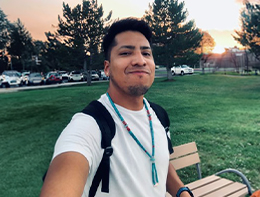 Zachary Beaver a Navajo from Ganado, AZ is majoring in Civil Engineering. As a Civil/ Environmental Engineering major, and an Indigenous student, he feels it is important to protect natural resources for Native Nations.
Zachary Beaver a Navajo from Ganado, AZ is majoring in Civil Engineering. As a Civil/ Environmental Engineering major, and an Indigenous student, he feels it is important to protect natural resources for Native Nations. Brooke Damon is currently a junior at Northern Arizona University working towards a bachelor’s degree in Environmental Science with an emphasis in Biology and a minor in Chemistry.
She is looking forward to continuing with a master’s degree after graduating. After completing her studies, she hopes to use her education to give back to the communities on the Navajo
Nation that her family has called home for years. She plans to make a difference in tribal efforts to mitigate the impacts of climate change and to give a voice to those who are often forgotten.
Brooke Damon is currently a junior at Northern Arizona University working towards a bachelor’s degree in Environmental Science with an emphasis in Biology and a minor in Chemistry.
She is looking forward to continuing with a master’s degree after graduating. After completing her studies, she hopes to use her education to give back to the communities on the Navajo
Nation that her family has called home for years. She plans to make a difference in tribal efforts to mitigate the impacts of climate change and to give a voice to those who are often forgotten.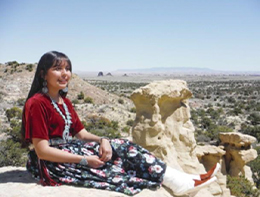 Chelsie Fowler is a young Navajo woman who is currently attending Northern Arizona University, studying to become an Environmental Engineer. She is originally from Chilchinbeto, AZ
and graduated top of her class from Monument Valley High School at Kayenta, AZ. She was able to attend NAU with a few scholarships that has allowed her to continue with her studies.
Academically, graduating from NAU is one of her major educational goals in life because she is a first-generation college student and is aiming to become a professional in her chosen
career field, so that she can offer her assistance to where the need is greatest, such as the Navajo Nation.
Chelsie Fowler is a young Navajo woman who is currently attending Northern Arizona University, studying to become an Environmental Engineer. She is originally from Chilchinbeto, AZ
and graduated top of her class from Monument Valley High School at Kayenta, AZ. She was able to attend NAU with a few scholarships that has allowed her to continue with her studies.
Academically, graduating from NAU is one of her major educational goals in life because she is a first-generation college student and is aiming to become a professional in her chosen
career field, so that she can offer her assistance to where the need is greatest, such as the Navajo Nation.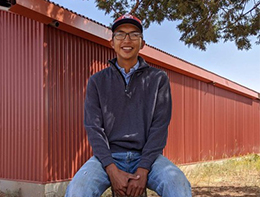 Jared Begay is a young Navajo man, who lives in a small rural town,Tsaile, AZ, in the middle of the Navajo Nation. He believes his agricultural background and a strong Navajo-cultural
ethic passed down to him by his family for the sacred life of the trees and the connection they share with Mother Earth has carved a deep passion for him to be a steward of the forest lands.
Once he earns his bachelor’s degree in Forestry, he would like to apply for graduate school to pursue a higher education with a Master’s in Science. He would love to study the cultural
significance that the study of forestry offers to the Navajo people. In the future, he would like to see the integration of ecological restoration and cultural management practices within
the forest on the Navajo Nation. He anticipates developing a Forest, Land & Range conservation plan to help maintain the forested areas, and the rangelands of the Navajo Nation.
Jared Begay is a young Navajo man, who lives in a small rural town,Tsaile, AZ, in the middle of the Navajo Nation. He believes his agricultural background and a strong Navajo-cultural
ethic passed down to him by his family for the sacred life of the trees and the connection they share with Mother Earth has carved a deep passion for him to be a steward of the forest lands.
Once he earns his bachelor’s degree in Forestry, he would like to apply for graduate school to pursue a higher education with a Master’s in Science. He would love to study the cultural
significance that the study of forestry offers to the Navajo people. In the future, he would like to see the integration of ecological restoration and cultural management practices within
the forest on the Navajo Nation. He anticipates developing a Forest, Land & Range conservation plan to help maintain the forested areas, and the rangelands of the Navajo Nation.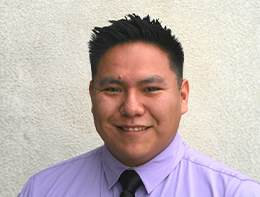 Joshua Wilson, a mechanical engineering student at Northern Arizona University, is continuing his education after 8 years of service in the United States Marine Corps. He is currently researching
the air quality around his home because of concerns about pollution from a major highway nearby. During his service in the military, he was exposure to exhaust fumes from diesel equipment among
other various pollutants. He believes these exposures exacerbated his asthma. Fearing that his chosen residence may be exposing his children to exhaust fumes from a highway as well as other family
members on the reservation also living near significant travel avenues, he is gathering particulate data both inside and outside of his home to understand environmental hazards better. Joshua plans
on using this data to create effective means of combating air pollution at home to protect his partner, his children, and his family.
Joshua Wilson, a mechanical engineering student at Northern Arizona University, is continuing his education after 8 years of service in the United States Marine Corps. He is currently researching
the air quality around his home because of concerns about pollution from a major highway nearby. During his service in the military, he was exposure to exhaust fumes from diesel equipment among
other various pollutants. He believes these exposures exacerbated his asthma. Fearing that his chosen residence may be exposing his children to exhaust fumes from a highway as well as other family
members on the reservation also living near significant travel avenues, he is gathering particulate data both inside and outside of his home to understand environmental hazards better. Joshua plans
on using this data to create effective means of combating air pollution at home to protect his partner, his children, and his family.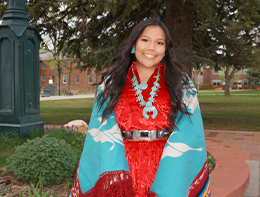 Karis Black is a member of the Navajo Nation and a current sophomore at Northern Arizona University pursuing a degree in Environmental Science with an emphasis in Climate. Karis Black has conducted lab
and fieldwork in the Navajo Nation to research heavy metal contamination in living organisms in Cove, Arizona where she quantified uranium concentrations in local plants and sheep. She has also worked
with the Cocopah tribe from Yuma, Arizona to improve and monitor the air and water quality. In the future, she plans to pursue a master’s degree and research paleoclimate within samples of lake sedimentation.
She enjoys working closely with tribes and wishes to continue doing so while focusing on environmental issues.
Karis Black is a member of the Navajo Nation and a current sophomore at Northern Arizona University pursuing a degree in Environmental Science with an emphasis in Climate. Karis Black has conducted lab
and fieldwork in the Navajo Nation to research heavy metal contamination in living organisms in Cove, Arizona where she quantified uranium concentrations in local plants and sheep. She has also worked
with the Cocopah tribe from Yuma, Arizona to improve and monitor the air and water quality. In the future, she plans to pursue a master’s degree and research paleoclimate within samples of lake sedimentation.
She enjoys working closely with tribes and wishes to continue doing so while focusing on environmental issues.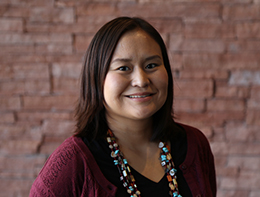 Wilda Anagal is Diné, originally from Black Mesa, Arizona. She is of the Bitter Water clan and born for the Black Sheep clan. Wilda received her Bachelor of Sciences in Environmental Science followed by her
Professional Science of Masters in Climate Science and Solutions from Northern Arizona University. She is a current PhD student at Northern Arizona University in the Earth Sciences and Environmental Sustainability
program. Wilda has a strong interest in supporting tribal communities in protecting their natural resources and environment. She plans to continue to support the on-going efforts to ensure a just and equitable
energy transition for Indigenous communities while tailoring her research to studying the social and economic impacts of energy transitions.
Wilda Anagal is Diné, originally from Black Mesa, Arizona. She is of the Bitter Water clan and born for the Black Sheep clan. Wilda received her Bachelor of Sciences in Environmental Science followed by her
Professional Science of Masters in Climate Science and Solutions from Northern Arizona University. She is a current PhD student at Northern Arizona University in the Earth Sciences and Environmental Sustainability
program. Wilda has a strong interest in supporting tribal communities in protecting their natural resources and environment. She plans to continue to support the on-going efforts to ensure a just and equitable
energy transition for Indigenous communities while tailoring her research to studying the social and economic impacts of energy transitions.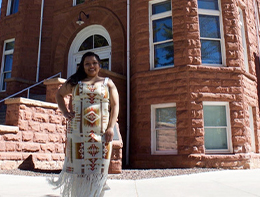 Marissa is from Shiprock, New Mexico and is currently attending Northern Arizona University as a graduate student in the Sustainable Communities program.
Her research focuses on investigating the uranium contamination found in the plant community that have been disturbed by uranium mining and the resulting
abandoned uranium mines in Cove, Arizona. Moving forward she hopes to continue her education to become a botanist, with the skills she is learning now and
will build on in the future, she hopes that this research will contribute to the reclamation and phytoremediation efforts on the Navajo Nation.
Marissa is from Shiprock, New Mexico and is currently attending Northern Arizona University as a graduate student in the Sustainable Communities program.
Her research focuses on investigating the uranium contamination found in the plant community that have been disturbed by uranium mining and the resulting
abandoned uranium mines in Cove, Arizona. Moving forward she hopes to continue her education to become a botanist, with the skills she is learning now and
will build on in the future, she hopes that this research will contribute to the reclamation and phytoremediation efforts on the Navajo Nation.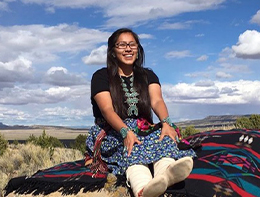 Brandee Keyonnie, a current Junior at Northern Arizona University, is studying towards a bachelor's degree in Environmental Science with an emphasis in Chemistry
and a minor in Sustainability. After earning a bachelor's degree in this field she plans to continue at Northern Arizona University to earn a master's degree in
Environmental Science. Her ultimate goal is to help transition the Navajo Nation to receive their energy through renewable resources (wind,solar, and biomass)
rather than non renewable resources (oil, coal, natural gases, and nuclear) so that Navajo Nation is creating less pollution and is no longer sending less workers
into mines where they are exposed to harmful chemicals. Brandee plans to work in a field environment and test soil and water around the Navajo Nation and ensure
it is safe for the people, livestock, plants, and food that they grow. She wants to able to help protect the people of the Navajo Nation and our Mother Earth.
Brandee Keyonnie, a current Junior at Northern Arizona University, is studying towards a bachelor's degree in Environmental Science with an emphasis in Chemistry
and a minor in Sustainability. After earning a bachelor's degree in this field she plans to continue at Northern Arizona University to earn a master's degree in
Environmental Science. Her ultimate goal is to help transition the Navajo Nation to receive their energy through renewable resources (wind,solar, and biomass)
rather than non renewable resources (oil, coal, natural gases, and nuclear) so that Navajo Nation is creating less pollution and is no longer sending less workers
into mines where they are exposed to harmful chemicals. Brandee plans to work in a field environment and test soil and water around the Navajo Nation and ensure
it is safe for the people, livestock, plants, and food that they grow. She wants to able to help protect the people of the Navajo Nation and our Mother Earth.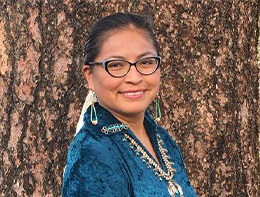 Priscilla is a member of the Navajo Tribe. She is originally from Klagetoh, AZ. She is of the Big Water clan born for the Honey Combed Rock People Clan. She is currently
pursuing her American Indigenous Studies, Indian Country Criminal Justice, Bachelor of Science degree. Priscilla has an interest in both tribal government as well as Federal
Indian Law. She hopes to one day become an advocate or a consultant with organizations to educate others about the legal system. Ms. Kee has a great interest in understanding
the tribal government and hopes to one day return to her community where she can be a voice for her people, especially, the Dine Elders. After earning her Bachelor of Science
degree, Ms. Kee would like to enter a Master’s Program and perhaps obtain a Law in Degree, eventually.
Priscilla is a member of the Navajo Tribe. She is originally from Klagetoh, AZ. She is of the Big Water clan born for the Honey Combed Rock People Clan. She is currently
pursuing her American Indigenous Studies, Indian Country Criminal Justice, Bachelor of Science degree. Priscilla has an interest in both tribal government as well as Federal
Indian Law. She hopes to one day become an advocate or a consultant with organizations to educate others about the legal system. Ms. Kee has a great interest in understanding
the tribal government and hopes to one day return to her community where she can be a voice for her people, especially, the Dine Elders. After earning her Bachelor of Science
degree, Ms. Kee would like to enter a Master’s Program and perhaps obtain a Law in Degree, eventually. Jared Begay is a young Navajo man, who resides in a small rural town called Tsaile, AZ, in the heart of the Navajo Nation. He believes his agricultural background and a strong
Navajo-cultural compassion passed down to him by his family for the sacred life of a tree and the connection it shares with Mother Earth has carved a deep passion for him to be
a steward of the forest lands and to pursue a degree in Forestry at the Northern University of Arizona. Once he earns his Bachelor’s degree in Forestry, he will apply for a job
as a Restoration Ecologist under the Navajo Nation Forestry Department. His goal after he gets his degree is to write a grant to help fund a Forest / Land & Range conservation
plan to help maintain the forested areas, and the rangelands of the Navajo communities.
Jared Begay is a young Navajo man, who resides in a small rural town called Tsaile, AZ, in the heart of the Navajo Nation. He believes his agricultural background and a strong
Navajo-cultural compassion passed down to him by his family for the sacred life of a tree and the connection it shares with Mother Earth has carved a deep passion for him to be
a steward of the forest lands and to pursue a degree in Forestry at the Northern University of Arizona. Once he earns his Bachelor’s degree in Forestry, he will apply for a job
as a Restoration Ecologist under the Navajo Nation Forestry Department. His goal after he gets his degree is to write a grant to help fund a Forest / Land & Range conservation
plan to help maintain the forested areas, and the rangelands of the Navajo communities.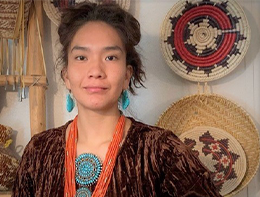 Siigrid a member of the Navajo tribe, is currently attending her sophomore year at Northern Arizona University (NAU).
At NAU, she majors in Biomedical Sciences with a minor in Studio Arts. After earning a bachelor’s degree, she plans
on continuing her education at the University of Pennsylvania to earn a medical degree in Orthopedic Surgery. Her
ultimate goal is to improve the medical care and the quality of hospitals in Native American communities.
Siigrid a member of the Navajo tribe, is currently attending her sophomore year at Northern Arizona University (NAU).
At NAU, she majors in Biomedical Sciences with a minor in Studio Arts. After earning a bachelor’s degree, she plans
on continuing her education at the University of Pennsylvania to earn a medical degree in Orthopedic Surgery. Her
ultimate goal is to improve the medical care and the quality of hospitals in Native American communities.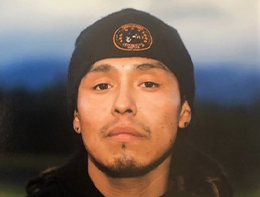 Michael is a student at Northern Arizona University (NAU) with a focus on wildlife management and forest management.
With a decade of experience in firefighting, he brings a knowledge of eye-witness accounts of the effects of wildfires
on different species, animals, and soil, as well as the environment in general. His vision emphasizes the environment
with a connection and responsibility as a Native American to protect Mother Earth.
Michael is a student at Northern Arizona University (NAU) with a focus on wildlife management and forest management.
With a decade of experience in firefighting, he brings a knowledge of eye-witness accounts of the effects of wildfires
on different species, animals, and soil, as well as the environment in general. His vision emphasizes the environment
with a connection and responsibility as a Native American to protect Mother Earth.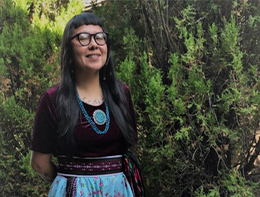 Tisheena is a Navajo from Shiprock, New Mexico. She is currently attending Northern Arizona University (NAU) on the Flagstaff,
Arizona campus. At NAU, she majors in Biology with a Wildlife Management emphasis. In the future, she would like to assist in
protecting natural resources on the Navajo Nation. Her vision includes that the Navajo Nation is a safe place to reside – with
fresh air quality, healthy plant life and sufficient or abundant clean water resources for all living Beings. In her career, she
plans to apply Tribal Ecological Knowledge (TEK) as part of her stewardship.
Tisheena is a Navajo from Shiprock, New Mexico. She is currently attending Northern Arizona University (NAU) on the Flagstaff,
Arizona campus. At NAU, she majors in Biology with a Wildlife Management emphasis. In the future, she would like to assist in
protecting natural resources on the Navajo Nation. Her vision includes that the Navajo Nation is a safe place to reside – with
fresh air quality, healthy plant life and sufficient or abundant clean water resources for all living Beings. In her career, she
plans to apply Tribal Ecological Knowledge (TEK) as part of her stewardship. Shanya comes from Aneth, Utah, the northern part of the Navajo Nation. She is a Environmental Engineer
major at Northern Arizona University (NAU). Her goal of becoming an engineer came from living on the reservation
where oil drilling is an economic support and a part of everyday life, as her grandparents and community struggled
from contaminated soil, water and air daily. This has motivated her to get her degree to protect not only her
community, but Indian Country from the environmental effects such as pollution to improve the environmental quality.
Shanya comes from Aneth, Utah, the northern part of the Navajo Nation. She is a Environmental Engineer
major at Northern Arizona University (NAU). Her goal of becoming an engineer came from living on the reservation
where oil drilling is an economic support and a part of everyday life, as her grandparents and community struggled
from contaminated soil, water and air daily. This has motivated her to get her degree to protect not only her
community, but Indian Country from the environmental effects such as pollution to improve the environmental quality.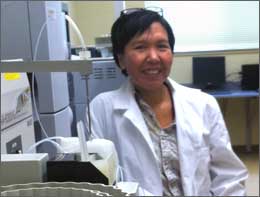 Josie is of Lummi and Yupik descent. Born in Anchorage, Alaska, she spent her school years in Alaska, and her summers in Lummi, Washington. She graduated for the Northwest Indian College with a Bachelor’s of Science-Native Environmental Science in June, 2016. From there,
she began as a Master’s of Professional Science-Climate Science and Solutions major at Northern Arizona University. She will graduate spring semester, 2018.
Josie is of Lummi and Yupik descent. Born in Anchorage, Alaska, she spent her school years in Alaska, and her summers in Lummi, Washington. She graduated for the Northwest Indian College with a Bachelor’s of Science-Native Environmental Science in June, 2016. From there,
she began as a Master’s of Professional Science-Climate Science and Solutions major at Northern Arizona University. She will graduate spring semester, 2018.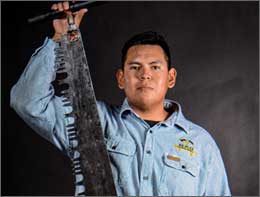 Chad Brown hails from the proud tribes of Santo Domingo Pueblo, Santa Clara Pueblo, and the Navajo Nation in New Mexico. He graduated high school from Santa Fe Indian School in Santa Fe, NM. He is currently attending Northern Arizona University and entered in their distinguished
Bachelor of Science program in Forestry. In the bachelors forestry program he is focused on obtaining a Fire Ecology and Management certificate. Chad is a non-traditional student and had worked full time for the Santa Clara Pueblo Forestry Department. Working for the
tribe has fueled his decision to return to education after realizing his passion for environmental and forest stewardship. He is also a student trainee (forestry) for the BIA TREES Pathways program, which provides him a means to work for Indian country after graduation.
Chad Brown hails from the proud tribes of Santo Domingo Pueblo, Santa Clara Pueblo, and the Navajo Nation in New Mexico. He graduated high school from Santa Fe Indian School in Santa Fe, NM. He is currently attending Northern Arizona University and entered in their distinguished
Bachelor of Science program in Forestry. In the bachelors forestry program he is focused on obtaining a Fire Ecology and Management certificate. Chad is a non-traditional student and had worked full time for the Santa Clara Pueblo Forestry Department. Working for the
tribe has fueled his decision to return to education after realizing his passion for environmental and forest stewardship. He is also a student trainee (forestry) for the BIA TREES Pathways program, which provides him a means to work for Indian country after graduation.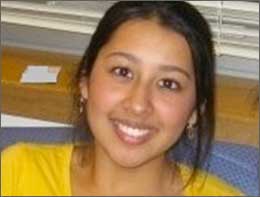 Riley Smith is a graduate student in the biology program at Northern Arizona University. She is originally from the San Francisco Bay Area in California and is Shoshone from the Shoshone-Bannock Nation at Fort Hall. Riley graduated from San Francisco State University with a
double major in ecology (B.S.) and Native American Studies (B.A.). In 2014, Riley became a student at NAU to pursue a degree in environmental health.
Riley Smith is a graduate student in the biology program at Northern Arizona University. She is originally from the San Francisco Bay Area in California and is Shoshone from the Shoshone-Bannock Nation at Fort Hall. Riley graduated from San Francisco State University with a
double major in ecology (B.S.) and Native American Studies (B.A.). In 2014, Riley became a student at NAU to pursue a degree in environmental health.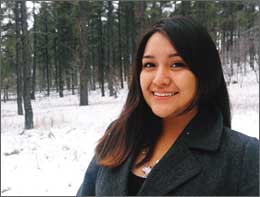 My name is Darrien Benally, I am a member of the Navajo tribe. I was born and raised in Flagstaff, Arizona. I transferred to NAU from Coconino Community College to peruse a bachelor’s of science degree in Applied Indigenous Studies with a minor in Environmental Sustainability.
My name is Darrien Benally, I am a member of the Navajo tribe. I was born and raised in Flagstaff, Arizona. I transferred to NAU from Coconino Community College to peruse a bachelor’s of science degree in Applied Indigenous Studies with a minor in Environmental Sustainability.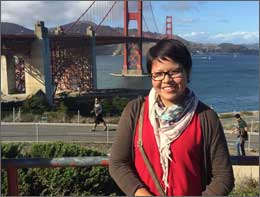 Mariah is a member of the Navajo Nation from Chichiltah, New Mexico. She graduated high school in 2010 from Santa Rita in Tucson, Arizona. She then attended Dine’ College in Tsaile, Arizona and received an Associate of Science (A.S.) Degree in 2013. From there she transferred
to Northern Arizona University where she is currently attending and studying Environmental Science with a Geology emphasis. She aspires to graduate in spring of 2016.
Mariah is a member of the Navajo Nation from Chichiltah, New Mexico. She graduated high school in 2010 from Santa Rita in Tucson, Arizona. She then attended Dine’ College in Tsaile, Arizona and received an Associate of Science (A.S.) Degree in 2013. From there she transferred
to Northern Arizona University where she is currently attending and studying Environmental Science with a Geology emphasis. She aspires to graduate in spring of 2016.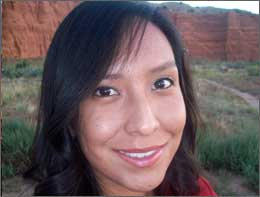 Dawnylle M. Smith is a Northern Arizona University alumnus with a bachelor’s degree in biology and a minor in chemistry. She is a Diné woman who worked with young Navajo high school students in her hometown of Ganado, Arizona as an educator. Currently, she is attending
NAU as a Climate Science and Solutions Professional Science Masters student with an anticipated graduation date of December 2016.
Dawnylle M. Smith is a Northern Arizona University alumnus with a bachelor’s degree in biology and a minor in chemistry. She is a Diné woman who worked with young Navajo high school students in her hometown of Ganado, Arizona as an educator. Currently, she is attending
NAU as a Climate Science and Solutions Professional Science Masters student with an anticipated graduation date of December 2016.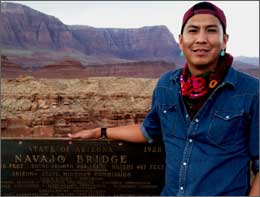 Deon Ben is a member of the Navajo Nation from the community of Tohatchi, NM. He is working on completing his Masters of Science in the school of Environmental Science & Policy with an emphasis on incorporating Traditional Ecological Knowledge (TEK) into Navajo community
land use planning to address climate challenges and applications.
Deon Ben is a member of the Navajo Nation from the community of Tohatchi, NM. He is working on completing his Masters of Science in the school of Environmental Science & Policy with an emphasis on incorporating Traditional Ecological Knowledge (TEK) into Navajo community
land use planning to address climate challenges and applications.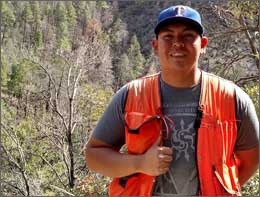 Chad Brown hails from the proud tribes of Santo Domingo Pueblo, Santa Clara Pueblo, and the Navajo Nation in New Mexico. He is a transfer student from New Mexico attending Northern Arizona University (NAU) and is pursuing a Bachelor’s of Science in Forestry. His focus
in the forestry program is the Fire Ecology and Management certificate. Organizations and clubs he is associated with are the BIA TREES PATHWAY Program and NAU’s Student Association for Fire Ecology (SAFE). He is a non-traditional student and has worked full time
for the Santa Clara Pueblo Forestry Department for two and a half years prior to attending NAU. Working for a tribal forestry department fueled his decision to return to education after realizing his passion in environmental and forest stewardship. Influences from the
leadership in the Santa Clara Pueblo Forestry Department have inspired him to choose his current career and higher education paths.
Chad Brown hails from the proud tribes of Santo Domingo Pueblo, Santa Clara Pueblo, and the Navajo Nation in New Mexico. He is a transfer student from New Mexico attending Northern Arizona University (NAU) and is pursuing a Bachelor’s of Science in Forestry. His focus
in the forestry program is the Fire Ecology and Management certificate. Organizations and clubs he is associated with are the BIA TREES PATHWAY Program and NAU’s Student Association for Fire Ecology (SAFE). He is a non-traditional student and has worked full time
for the Santa Clara Pueblo Forestry Department for two and a half years prior to attending NAU. Working for a tribal forestry department fueled his decision to return to education after realizing his passion in environmental and forest stewardship. Influences from the
leadership in the Santa Clara Pueblo Forestry Department have inspired him to choose his current career and higher education paths.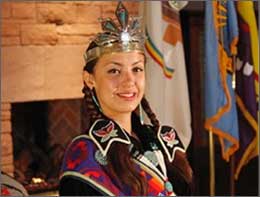 Erin O'Keefe, a Northern Arizona University (NAU) student, from Gallup, NM is Dine of the Water That Flows Together clan born for the Anishinaabe
Eagle clan. She has a BA degree in Applied Indigenous Studies (AIS) and a BS in Communication Studies from NAU, and is currently working on a
Master's in Sustainable Communities at NAU.
Erin O'Keefe, a Northern Arizona University (NAU) student, from Gallup, NM is Dine of the Water That Flows Together clan born for the Anishinaabe
Eagle clan. She has a BA degree in Applied Indigenous Studies (AIS) and a BS in Communication Studies from NAU, and is currently working on a
Master's in Sustainable Communities at NAU. John is a
sophomore at Northern Arizona University studying Environmental Science applied Geology.
John is a
sophomore at Northern Arizona University studying Environmental Science applied Geology.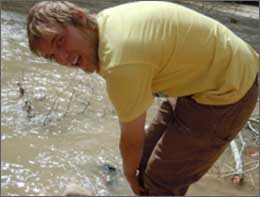 Jamie
is a senior majoring in engineering. Jamie is originally from Valdez, Alaska and affiliated with the Sault Ste. Marie tribe of Chippewa Indians from
Michigan. He is a member of the Northern Arizona University Hiking and Society of Hispanic Engineers clubs.
Jamie
is a senior majoring in engineering. Jamie is originally from Valdez, Alaska and affiliated with the Sault Ste. Marie tribe of Chippewa Indians from
Michigan. He is a member of the Northern Arizona University Hiking and Society of Hispanic Engineers clubs.
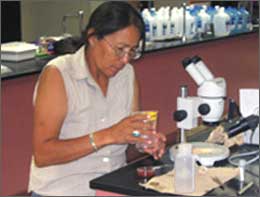 Beverly is
from Shiprock, New Mexico where she was born and raised. She has an Associate of Arts in Liberal Arts from Dine College and a Bachelors of Science in
Environmental Biology from Fort Lewis College. She is a first-year graduate student in the Master of Science Biology program at Northern Arizona University.
Her thesis research plan is to characterize and analyze ant distribution along the elevational gradient on the Carrizo Mountain on the Navajo reservation.
The research will integrate Navajo cultural values and the scientific method, provide an opportunity for undergraduate students to learn field research,
and foster an appreciation for the ant diversity on the Navajo Reservation.
Beverly is
from Shiprock, New Mexico where she was born and raised. She has an Associate of Arts in Liberal Arts from Dine College and a Bachelors of Science in
Environmental Biology from Fort Lewis College. She is a first-year graduate student in the Master of Science Biology program at Northern Arizona University.
Her thesis research plan is to characterize and analyze ant distribution along the elevational gradient on the Carrizo Mountain on the Navajo reservation.
The research will integrate Navajo cultural values and the scientific method, provide an opportunity for undergraduate students to learn field research,
and foster an appreciation for the ant diversity on the Navajo Reservation.
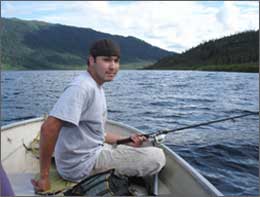 Christopher, a Native
Alaskan from the community of Bettles, AK, is seeking two degrees at Northern Arizona University (NAU), one in Mechanical Engineering, another in Civil Engineering.
Although he has struggled to finance his college education, he believes the experiences gained while working have helped mold him into the person he is becoming.
Christopher, a Native
Alaskan from the community of Bettles, AK, is seeking two degrees at Northern Arizona University (NAU), one in Mechanical Engineering, another in Civil Engineering.
Although he has struggled to finance his college education, he believes the experiences gained while working have helped mold him into the person he is becoming.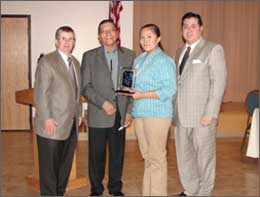 B.S. Chemistry, 2006 NAU
B.S. Chemistry, 2006 NAU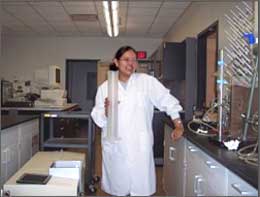 Major: Environmental Engineering
Major: Environmental Engineering